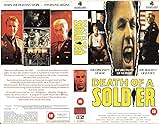Aggiungi una trama nella tua linguaBased on a true story, James Coburn portrays a military lawyer assigned to defend a confessed psychotic killer. Set in the context of WWII and the uneasy US-Australian military alliance. The... Leggi tuttoBased on a true story, James Coburn portrays a military lawyer assigned to defend a confessed psychotic killer. Set in the context of WWII and the uneasy US-Australian military alliance. The accused killer claims to have killed 3 women in order to possess their voices. Despite th... Leggi tuttoBased on a true story, James Coburn portrays a military lawyer assigned to defend a confessed psychotic killer. Set in the context of WWII and the uneasy US-Australian military alliance. The accused killer claims to have killed 3 women in order to possess their voices. Despite the defense lawyer's concerns that the killer is not fit to stand trial, the US military pre... Leggi tutto
- Regia
- Sceneggiatura
- Star
- Premi
- 2 candidature totali
- Det. Sgt. Martin
- (as Maurice Fields)
- Col. Williams
- (as John McTiernan)
Recensioni in evidenza
"Death of a Soldier" looks at life in Melbourne in 1942 when General MacArthur and the Americans hit town. There were tensions, but the film takes the urban myths of the time and gives them a large dose of anabolic steroids.
The film's strength is in the story of Eddie Leonski the American soldier who strangled three Australian women (The Brownout Murders). After reading "Murder at Dusk" by Ian W. Shaw I was surprised at how close the film stayed to the facts of the case.
James Coburn as Major Patrick Dannenberg has a lot of work to do in the film. Not only does he manage relations between the Americans and the Australians, but also becomes deeply involved in the investigation of the murders. Bill Hunter and Maurie Fields play Australian detectives investigating Leonski's crimes. They do this with a series of poses - standing with their hands in their pockets at the crime scenes or leaning against the bar of the local boozer.
Reb Brown played Eddie Leonski. He's a powerful-looking dude and although his performance seems over-the-top, apparently Eddie Leonski was that crazy. Another impressive performance was delivered by formidable, 6'4" Australian Max Fairchild as MP Major Fricks, a man you would instinctively address as "Sir".
Other reviewers have pointed out that there was always the perception that something like the shootout between American and Australian soldiers had happened. But the origin of the incident would seem to be the one given in the "The Battle of Brisbane" by Peter Thompson, when a U.S. soldier was pursued and shot by Australian police and soldiers after he killed an Australian on a train. Hardly the shootout depicted in the film with casualties rivalling the assault on Buna.
My main criticism of the film is that it's all sensation with very little balance. In reality much of the aggression between the two allies involved brawls between scrappy young men who probably went in for that sort of thing back in civilian life anyway. Similar things happened in New Zealand (The Battle of Manners Street).
Not all Australians felt put upon. 15,000 Australians married Americans (possibly that left some Aussies fuming), but most Australians appreciated that despite gutsy efforts by the Diggers in New Guinea, the situation would have been dire if the U.S. had not arrived in force in 1942.
But perceptions are important and the negative vibe in "Death of a Soldier" probably carries more weight than it should. Maybe Dr. Brendan Nelson, the director of the Australian War Memorial, put things into broader perspective during a speech to the National Press Club in 2013:
"... I've said to the Americans in particular in various roles I've had that not a day goes by in this country where we don't give thanks and gratitude for American sacrifice in this part of the world".
Lo sapevi?
- QuizThis movie is based on the true story of the murders of three Melbourne women by a US Army private stationed near the city during World War II. The series of killings are known as The Brown-Out Murders while the killer, Pvt. Eddie Leonski, was known as "The Brownout Strangler" or "The Brownout Murderer". "Brown-out" was a term used during the war when people would dim the lights in their houses to reduce the chances of enemy airplanes using them as a "beacon" for aerial bombing. At the time of the murders, Melbourne was in the thick of brown-out, in which the streets were dark and shadowy.
- ConnessioniFeatured in The Spoony Experiment: Death of a Soldier (2011)
- Colonne sonoreSentimental Dreams
music by Allan Zavod
lyrics by Marty Fields
sung by Kerrie Biddell
published by Filmtrax PLC
I più visti
Dettagli
- Tempo di esecuzione
- 1h 33min(93 min)
- Colore
- Mix di suoni
- Proporzioni
- 2.39 : 1













